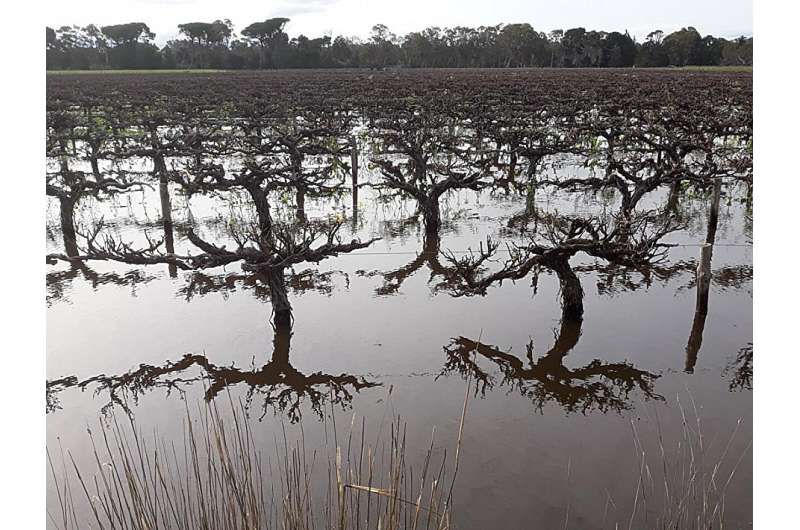This article has been reviewed according to Science X's editorial process and policies. Editors have highlighted the following attributes while ensuring the content's credibility:
fact-checked
trusted source
proofread
Politicization of water use exacerbates farmers' distrust, researchers find

Researchers have found that in agricultural areas with declining resource availability, climate-adaptation risks increase when discussion about water allocation becomes politicized.
The finding was made through the examination of water management in the Langhorne Creek viticultural region, where researchers assessed the hydrosocial risk in 2021.
"Hydrosocial risks arise from the social processes that influence, and are influenced by, human interactions with water," says Associate Professor Douglas Bardsley, from the University of Adelaide's School of Social Sciences, who produced the study in association with colleagues Associate Professor Georgina Drew and Dr. Bill Skinner.
"These risks have become more prominent over the last 20 years due to increasing impacts of climate change and more extreme events, such as the Millennium Drought, which led to the over-use and depletion of some water resources."
Langhorne Creek has a history of managing issues such as floods, over-use of groundwater, and increasing salinity in nearby water resources.
The region displayed an innovative attitude when managing these issues, which it achieved through excellent organization, links to government, and by working together as a community.
"Strong engagement processes were initiated during the crisis of the Millennium Drought, and they led to some great hydrosocial processes," says Associate Professor Bardsley.
"This led to a range of innovations, such as new water infrastructure, agro-ecosystems and water recycling. People also organized and worked to prioritize the sustainability of water resource systems."
However, the collaborative processes developed during this period did not last long-term.
"After the crisis passed, the processes were politicized by the government, and technical solutions were prioritized over the important participatory approach that was developed earlier," says Associate Professor Bardsley.
"The outcome of this is now many landholders feel marginalized from water-resource science and decision-making."
According to Associate Professor Bardsley's study, which was published in Geographical Research, if the politicization of hydrosocial processes occurs, communities experiencing hydrosocial risks could miss critical opportunities for climate adaptation.
"What we saw during the Millennium Drought was landholders and other stakeholders recognizing that limits needed to be placed on ground and surface water extraction," Associate Professor Bardsley says.
"Planning was therefore tolerated because it was well understood, and provided irrigators with confidence they could make long-term decisions around the new allocations."
To ensure this type of outcome can be achieved, authentic engagement between science, policy and stakeholders should occur.
"Currently, future climate change projections are insufficiently incorporated into water planning," says Associate Professor Bardsley.
"There is an iterative process of updating allocations built into water planning, but long-term policy will need to increasingly incorporate future constraints in water resource availability.
"It is also important that effective scientific knowledge for water management is developed with strong processes alongside landholders so that everyone understands and supports the decisions that eventuate from that new knowledge."
More information: Douglas K. Bardsley et al, The governance of hydrosocial risk in peri‐urban South Australia, Geographical Research (2024). DOI: 10.1111/1745-5871.12666
Provided by University of Adelaide





















